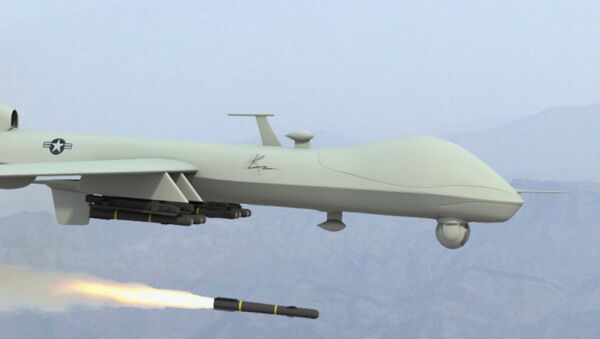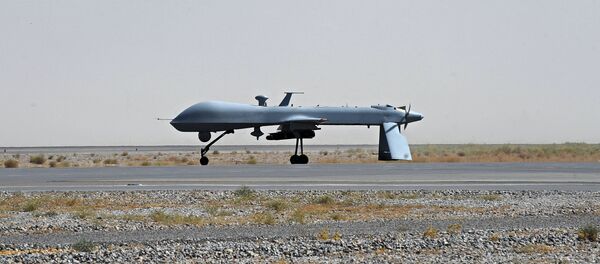The one-page "Joint Declaration for the Export and Subsequent Use of Armed or Strike-Enabled Unmanned Aerial Vehicles (UAVs)," lists five general principles to govern trade in armed drones, Defense News reports.
Defense News first reported on the draft declaration in August, when the document contained language on the "applicability of international law" and human rights in the use of armed drones; commitments to existing arms control laws to govern the sale of drone systems, promises that drone exporters must take "into account the potential recipient country’s history regarding adherence to international obligations and commitments,” and that exporters of unmanned armed systems must follow "appropriate transparency measures" when required, and a resolution to "ensure these capabilities are transferred and used responsibly by all States."
Signatories include the US, Argentina, Australia, Austria, Belgium, Bulgaria, Canada, Chile, Colombia, the Czech Republic, El Salvador, Estonia, Finland, Georgia, Germany, Hungary, Ireland, Italy, Japan, Latvia, Lithuania, Luxembourg, Malawi, Montenegro, Netherlands, New Zealand, Paraguay, Philippines, Poland, Portugal, South Korea, Romania, Serbia, the Seychelles, Singapore, Slovakia, Slovenia, Spain, Sri Lanka, Sweden, Ukraine, the UK and Uruguay. Missing from this list are current or potential future exporters of armed drones Russia, China, India and Israel, as well as importers France and the UAE.
Rachel Stohl of the Stimson Center, a nonpartisan policy research center that addresses security issues, said in a statement that while the effort is laudable, "the joint declaration does not go far enough to ensure that the standards are meaningful, nor does it set a high enough bar to ensure responsible transfer and proper use of military drones. … the joint declaration does not provide the specific guidelines as to how these standards will be developed, nor what they will include. A long-term and sustained commitment to the development of these principles is required."
She notes that the responsibility of developing more detailed drone rules will fall to the next US administration, "which may not place the same priority on developing high standards."
According to the Deputy Assistant Secretary for Defense Trade Controls at the US State Department, Brian Nilsson, the US is following the example used to develop the International Code of Conduct against Ballistic Missile Proliferation (the Hague Code of Conduct or HCOC), in which a small group of countries agreed first on principles, then elaborated details together in a series of meetings that gradually expanded as other countries joined. Countries signing on to this new set of principles will have a role in discussions next year to come to more specific conclusions, Nilsson told Defense News recently.
In further analysis of the declaration for Defense News, Stohl points out that the version of the document expected to be released today is more problematic than the original.
The current version introduces qualifiers, exceptions and caveats that make it clear that individual countries will still be able to create and adhere to their own standards in using armed drone systems. The document says "none of [the principals] should be construed to undermine the legitimate interest of any State to indigenously produce, export, or acquire such systems for legitimate purposes," she writes.
Stohl cites concerns by other governments, including fears that the declaration could provide "a blank check" for the future use and export of drones, that it legitimizes past controversial US drone use, and therefore offers an opening for the US and other nations to continue such practices, and that the document, in essence, sanctions "unilateral action" against "perceived threats in secret and without a declaration of war, a dangerous precedent that the United States has perpetuated."
The Stimson Center in February graded the Obama Administration poorly on the transparency and accountability of the country’s drone policy, giving it "a failing grade" in three areas having to do with increasing transparency and public accountability on drone strikes, targets outside of traditional battlefields, and explaining the domestic and international legal basis for America’s lethal drone program. Stimson gave the administration a passing grade of C for its efforts in releasing a new export policy on drones; apparently, the actual policy has come as a disappointment.




